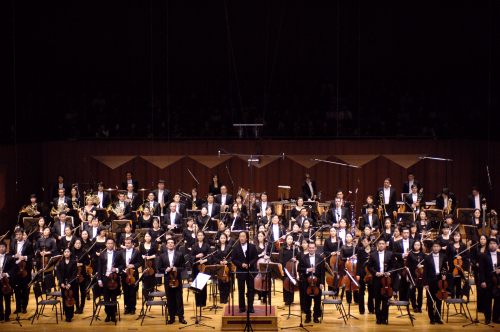The Mahler craze started in 2010 when Korean classical concert-goers scrambled to get tickets to Gustav Mahler’s symphonies at the Seoul Arts Center. Last year, the Seoul Philharmonic Orchestra and conductor Chung Myung-whun began staging the Austrian composer’s all-symphonic works to mark the 150th anniversary of his birth.
Coming into 2011, Mahler fever is sweeping the nation even faster than last year, with more than half of tickets to the six concerts of the Seoul Phil’s “2011 Mahler Series” ― Symphonies No. 4, 5, 6, 7, 9 and 8 in this order ― already sold-out.
While Mahler’s works normally get a variety of evaluations from music critics ― pretentious, vulgar, difficult, supremely creative or ingeniously using orchestral instruments ― the Seoul Phil and Chung will begin the 2011 series with Symphony No. 4 on Jan. 14 at the Seoul Arts Center.
Symphony No. 4 is deemed the simplest and brightest piece among Mahler’s 10 symphonies, as Mahler had his golden days during 1899-1901. He attached “humoresque” as a subtitle to the No. 4.
Scottish soprano Lisa Milne will collaborate in the fourth and last movement, “Heaven’s Life” which wraps up the Symphony No. 4. She will also sing Mozart “Exsultate Jubilate” K. 165.
Mahler (1869-1911) is considered a rare composer who agonized over, but expressed well, the transition from the 19th century Austrian musical tradition to the modernism of early 20th century.
 |
Seoul Philarmonic Orchestra with conductor Chung Myung-whun (Seoul Philarmonic Orchestra) |
When he was alive, few of his symphonic works were recognized. After World War II, however, he has become one of the most frequently performed composers.
On Jan. 21, The Seoul Phil will showcase Symphony No. 5, composed during a time of great change in Mahler’s life.
The composer wrote it in the summers between 1901 and 1902 when he had a successful job ― director of Vienna Court Opera and the principal conductor of the Vienna Philharmonic ― considered marriage with Alma Schindler and had several surgeries due to health problems.
The darkness in the first two movements of the No. 5 contrast starkly with the bright third movement. The fourth movement “Adagietto” became famous after being used in the 1971 Luchino Visconti film “Death in Venice.”
The Jan. 21 concert is to be joined by piano prodigy Cho Sung-jin, who will play Mozart Piano Concerto No. 20.
Although the two concerts in January and the last concert on Dec. 22 are all sold out, there are still some tickets for Mahler’s No. 6 on Oct. 20, the No. 7 on Nov. 11 and the No. 9 on Dec. 9, said Kim Jin-young, spokesperson for the Seoul Philharmonic Orchestra.
The popularity of the Mahler series has also boosted the Seoul Phil’s other package tickets.
The orchestra’s “Master Piece Series” and “Explorer Series” are also all sold out, according to Kim.
“People seem to have rushed to get tickets early as they felt that it was difficult to get tickets last year,” Kim said.
Those who cannot get tickets for the Seoul Phil’s Mahler series can enjoy Berlin Philharmonic Orchestra’s Mahler Symphony No. 9 under conductor Simon Rattle on Nov. 15 at the Seoul Arts Center.
The Seoul Phil’s Mahler series tickets range from 10,000 won to 100,000 won. For details, call 1588-1210.
By Kim Yoon-mi (
yoonmi@heraldcorp.com)


![[Herald Interview] 'Korea, don't repeat Hong Kong's mistakes on foreign caregivers'](http://res.heraldm.com/phpwas/restmb_idxmake.php?idx=644&simg=/content/image/2024/11/13/20241113050481_0.jpg)
![[KH Explains] Why Yoon golfing is so controversial](http://res.heraldm.com/phpwas/restmb_idxmake.php?idx=644&simg=/content/image/2024/11/13/20241113050608_0.jpg)




